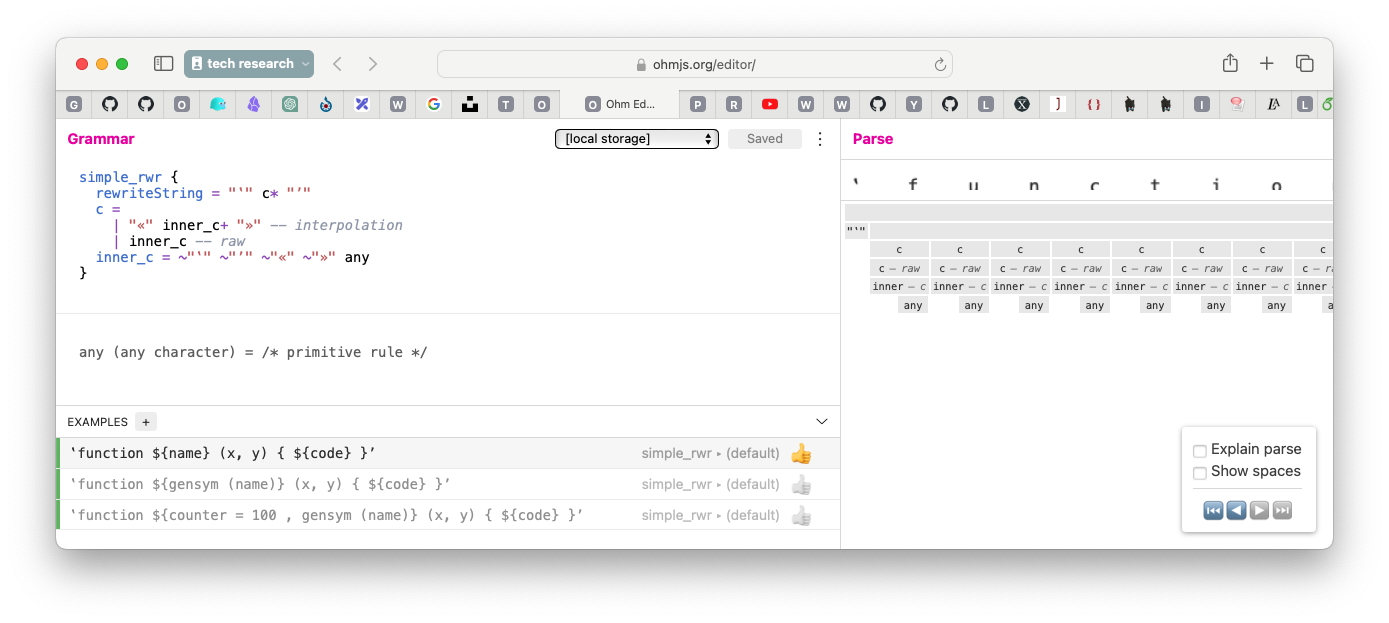Embedding code snippets in new syntaxes
Embedding Code Snippets in New Syntaxes
In general, I write t2t - text-to-text converters - that address a specific issue instead of writing a whole new language from scratch. I generate code for some host language, then let the host language compiler do the heavy lifting.
For example, I might create a syntax for control flow, like Statecharts, that uses embedded Javascript to handle most of the bits of programming that don’t need to be redefined.
A particular example of this is the .rwr syntax for my RWR (“ReWRiter”) DSL for helping me write DSLs.
In RWR, a rewrite string is a string of characters and string interpolations surrounded by Unicode quotes ‛...’. Using separate characters for “open” and “close” just makes parsing this easier with OhmJS and PEG. Unicode has so many characters that we can afford the luxury of cherry-picking characters that we want to use and to hard-code their meaning forever. ASCII is limited to 96 characters (printables other than whitespace and control characters), so you are - subtly - reluctant to waste ASCII characters in this way, and, instead, you do hard-to-parse things like re-using " to mean string-begin AND string-end. This, also, blocks recursive pattern matching like that in PEG.
In an RWR rewrite string, any ASCII character is valid and is simply copied to the output.
The special Unicode brackets «...» signify a string interpolation. The ... can be any valid Javascript expression. Usually, you say «x» to mean “insert the value of the Javascript variable x at this point”, but, sometimes you say «fn(y)» to mean “call the function f with parameter y and insert the returned string here.”
Example 1
The following rewrite string:
`function «name» () { «code» }’
Might be rewritten as:
function rewrite (name, code) {
return `function ${name} { ${code} }`;
}
The above is legal JS, where the string returned by the function is a Javascript template string. In a template string, anything surrounded by ${...} is evaluated and results in a character string.
A working version of the code (run make in embeddingsnippets)…
function rewrite (name, code) {
return `function ${name} (x, y) { ${code} }`;
}
console.log (rewrite ("f", "return x + y;"));
output is:
function f (x, y) { return x + y; }
Example 2
let counter = 42;
function gensym (basename) {
let n = counter;
counter += 1;
return `${basename}_${n}`;
}
function rewrite (name, code) {
return `function ${gensym (name)} (x, y) { ${code} }`;
}
console.log (rewrite ("f", "return x + y;"));
output is:
function f_42 (x, y) { return x + y; }
More
Of course, you can go nuts and start using the comma operator to string multiple expressions together, using the value of only the last one.
let counter = 42;
function gensym (basename) {
let n = counter;
counter += 1;
return `${basename}_${n}`;
}
function rewrite (name, code) {
return `function ${counter = 100 , gensym (name)} (x, y) { ${code} }`;
}
console.log (rewrite ("f", "return x + y;"));
output is:
function f_100 (x, y) { return x + y; }
Ohm
A grammar for the above can be defined as:
simple_rwr {
rewriteString = "‛" c* "’"
c =
| "«" inner_c+ "»" -- interpolation
| inner_c -- raw
inner_c = ~"‛" ~"’" ~"«" ~"»" any
}

RWR
And the RWR for the above grammar is
simple_rwr {
rewriteString [lq c* rq] = ‛«lq»«c»«rq»’
c_interpolation [lb c+ rb] = ‛«lb»«c»«rb»’
c_raw [c] = ‛«c»’
}
[TBD - I haven’t implemented this bit yet and got it to run. I will be developing this using the existing drawware tools and the existing ‘transpile’ component. Keep in touch. Collaborators welcome.]
Appendix - See Also
References
https://guitarvydas.github.io/2004/01/06/References.html
Blog
Blog
obsidian blogs (see blogs that begin with a date 202x-xx-xx-)
Videos
videos - programming simplicity playlist
Pamphlets
Discord
Programming Simplicity all welcome, I invite more discussion of these topics, esp. regarding Drawware and 0D
@paul_tarvydas